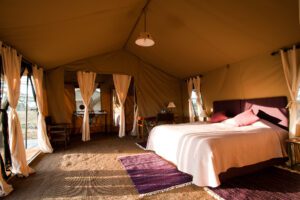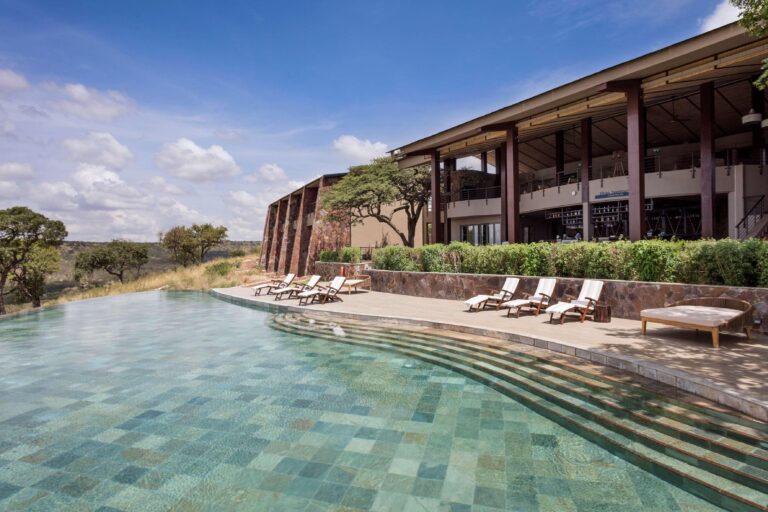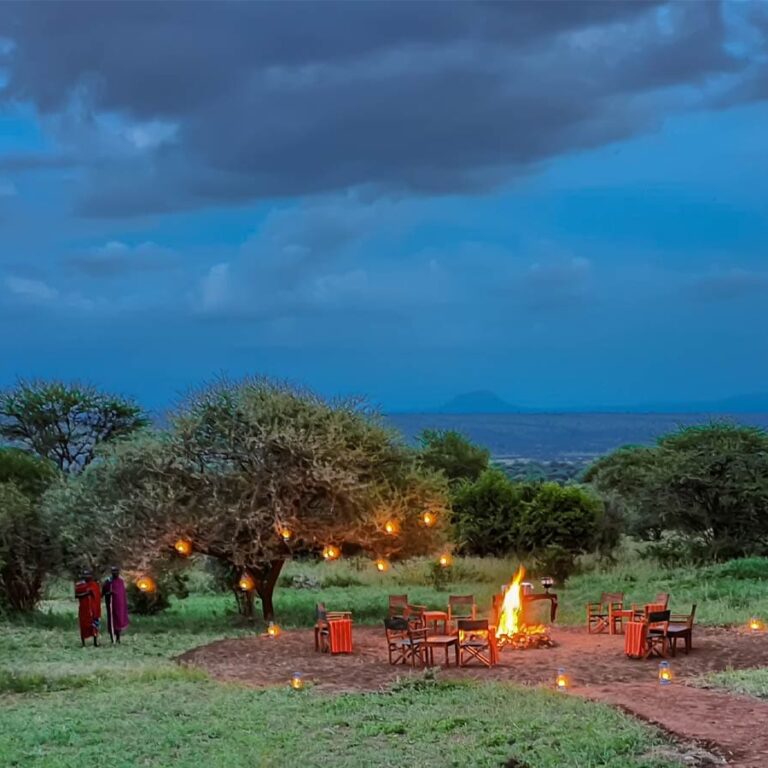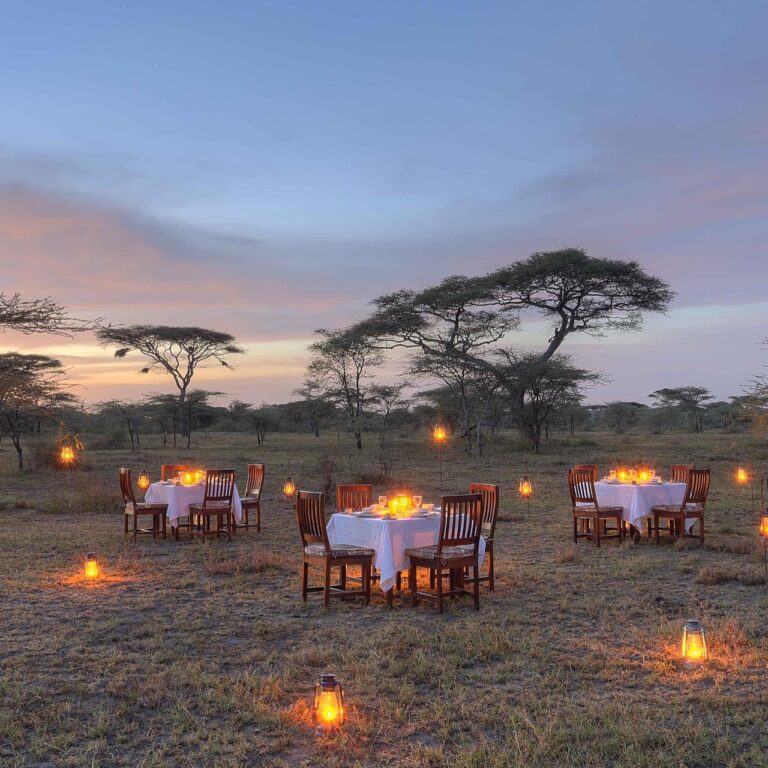Choosing the wet season for your Tanzania safari offers surprising rewards. From November to May, landscapes in Serengeti National Park and Ngorongoro Crater turn lush and vibrant, creating breathtaking scenery and dramatic skies perfect for photography. This is also calving season in the Serengeti, when thousands of wildebeest are born, attracting active predators and unforgettable wildlife encounters. Fewer tourists mean quieter game drives and more intimate sightings. Birdwatchers will love the arrival of migratory species, especially around wetlands like Lake Manyara National Park. Rain typically falls in short showers, leaving fresh, cooler air and less dust. Added to this, many lodges offer lower rates and special promotions, making luxury safaris more affordable. The wet season blends value, beauty, and wildlife drama into a uniquely rewarding safari experience.
1. Fewer Crowds, More Privacy
Traveling in the wet season transforms your safari into a more intimate wilderness experience. In iconic parks like Serengeti National Park and Ngorongoro Crater, visitor numbers naturally drop as many travelers prefer the dry months. What does that mean for you? Fewer vehicles at sightings, more uninterrupted wildlife moments, and a deeper sense of exclusivity. Imagine watching a pride of lions without a line of safari jeeps nearby, or enjoying a quiet sundowner surrounded only by open plains and distant thunderclouds. Lodges feel calmer, guides have more flexibility with schedules, and game drives are less rushed. The experience becomes more personal and immersive. For couples, families, or solo adventurers seeking authenticity rather than crowds, the wet season offers space to breathe and truly connect with Tanzania’s wild landscapes. It’s not just a safari — it’s your private window into nature.
2. Dramatic, Lush Landscapes
The rains spectacularly awaken Tanzania’s wilderness. Dry golden plains transform into emerald carpets, rivers swell, and acacia trees burst into vibrant life. In parks such as Tarangire National Park and Lake Manyara National Park, the scenery becomes intensely photogenic and refreshingly green. Wildflowers bloom across the savannah, and dramatic cloud formations create cinematic horizons. Waterfalls flow stronger, and seasonal streams return to life. The air feels cleaner, fresher, and cooler compared to the dusty dry season. For travelers who appreciate landscapes as much as wildlife, this period offers unmatched beauty. Every game drive feels like exploring a newly painted canvas. The contrast between stormy skies and sunlit grasslands adds depth and emotion to every view. Choosing the wet season means witnessing Tanzania at its most colorful and vibrant — a side many visitors never experience.
3. Wildebeest Calving Season
One of the most compelling reasons to travel during the wet season is the incredible calving spectacle in Serengeti National Park. Between January and March, hundreds of thousands of wildebeest give birth within a short period. The southern plains become nurseries of new life, where tiny calves take their first wobbly steps just minutes after birth. This abundance of vulnerable young also attracts predators, creating dramatic wildlife encounters. Lions, cheetahs, and hyenas are highly active, resulting in some of the most intense predator-prey interactions of the year. Unlike the river crossings of the dry season, calving season offers a different but equally powerful chapter of the Great Migration. It is raw, emotional, and deeply moving. For wildlife enthusiasts and photographers, witnessing this cycle of life is unforgettable — a reminder of nature’s resilience and beauty.
4. Spectacular Bird Watching
The wet season is paradise for bird lovers. Migratory species arrive from Europe and Asia, joining Tanzania’s rich resident birdlife. In areas like Lake Natron and Arusha National Park, wetlands and forests come alive with color and sound. Flamingos gather in impressive numbers, while storks, bee-eaters, and kingfishers display vibrant breeding plumage. With water sources replenished, birds are more active and easier to observe. Even travelers who are not dedicated birders often find themselves captivated by the diversity and beauty. The dramatic skies and fresh vegetation provide stunning backdrops for bird photography. Guides also have more time to focus on smaller details due to lighter tourist traffic. Whether you are an avid ornithologist or simply appreciate nature’s variety, the wet season delivers extraordinary avian experiences.
5. Lower Prices and Special Offers
The wet season often comes with attractive financial advantages. Many lodges and camps reduce their rates, offering excellent value for luxury experiences. In destinations such as Ngorongoro Conservation Area and Serengeti National Park, you may find discounted accommodation, special promotions, and added benefits like complimentary nights or private upgrades. Tour operators also provide competitive safari packages, making high-end travel more accessible. For families or honeymooners seeking premium comfort without peak-season pricing, this is a strategic time to travel. Lower costs do not mean lower quality — wildlife remains abundant, and landscapes are at their most vibrant. Choosing the wet season can significantly stretch your safari budget, allowing you to enjoy longer stays, upgraded lodges, or even combine your adventure with a beach escape.
6. Perfect Photography Lighting
Photographers often cherish the wet season for its dramatic natural lighting. The combination of moody clouds, filtered sunlight, and fresh greenery creates dynamic compositions. In open plains like those of Serengeti National Park, light breaks through storm clouds in golden beams, producing breathtaking scenes. Early mornings feel misty and atmospheric, while late afternoons glow with rich contrast. The air is clearer, reducing haze and enhancing color saturation. Rain showers are typically brief, followed by spectacular rainbows and glowing skies. Wildlife against lush backgrounds appears more striking than in dry, dusty settings. The wet season offers a variety of textures and tones that elevate both professional and amateur photography. Each frame tells a deeper story — one of renewal, energy, and life.
7. Easier Tracking of Wildlife
While some assume wildlife is harder to find during the wet months, the opposite can be true. Fresh grass attracts herbivores to open plains, making them easier to spot against vibrant green backdrops. In areas like Tarangire National Park, animals disperse naturally but remain active throughout the day due to cooler temperatures. Predators follow migrating herds, increasing the chances of sightings. Skilled guides rely on tracks, fresh scents, and bird behavior to locate wildlife efficiently. Because there are fewer vehicles, animals are often more relaxed, allowing for longer and more natural observations. The experience feels authentic and less pressured. Instead of racing between crowded sightings, you enjoy thoughtful tracking and meaningful encounters with Tanzania’s remarkable wildlife.
8. Fewer Dust Issues
Dry season safaris can be thrilling, but they often come with heavy dust, especially on unpaved roads. During the wet season, rainfall settles the ground, dramatically reducing dust clouds. In parks such as Lake Manyara National Park and Ngorongoro Crater, game drives feel fresher and more comfortable. The air is clearer, making breathing easier and improving visibility for photography. Vehicles stay cleaner, and there is less need to cover cameras or personal items. This subtle yet meaningful advantage enhances overall comfort. Travelers sensitive to dust particularly appreciate this benefit. The experience becomes more pleasant and relaxed, allowing you to focus fully on wildlife and scenery without the constant haze of fine savannah dust.
9. A Fresher, Cooler Environment
The wet season often brings milder temperatures compared to the intense heat of the dry months. Early mornings feel crisp, and afternoons are refreshed by light showers. In highland areas near Ngorongoro Crater and Arusha, the climate becomes particularly pleasant. The rains cleanse the air, leaving it cool and fragrant with the scent of wet earth and blooming vegetation. Wildlife remains active for longer periods, increasing viewing opportunities throughout the day. Travelers also find midday game drives more comfortable. The environment feels renewed and alive, enhancing every sensory detail of your safari. Rather than enduring dry heat, you explore Tanzania in a season of freshness and vitality.
10. Dynamic Predator Action
The wet season’s abundance of prey creates heightened predator activity. In the southern plains of Serengeti National Park, calving season attracts lions, cheetahs, and hyenas in impressive numbers. With vulnerable young animals present, predators hunt frequently, resulting in dramatic encounters. Cooler temperatures also mean carnivores are active during daylight hours, increasing your chances of witnessing natural behavior. The landscape’s lush cover adds suspense to every sighting. These interactions reflect the raw balance of life in the wild — intense yet essential. For wildlife enthusiasts seeking thrilling moments and authentic safari drama, the wet season delivers unforgettable experiences filled with action and emotion.
11. Affordable Rates and Special Offers
Traveling during the wet season often unlocks exceptional value. Safari lodges across Serengeti National Park and Tarangire National Park frequently introduce promotional rates, stay-three-pay-two offers, and discounted fly-in packages. This makes premium safaris more attainable without compromising quality. Tour operators may include added services such as private transfers or complimentary upgrades. For budget-conscious travelers who still desire a high-end experience, this season presents a strategic advantage. You enjoy the same wildlife, dramatic landscapes, and expert guiding — often at significantly reduced costs. By choosing the wet season, you maximize both experience and value, turning your Tanzania safari into an affordable luxury adventure.
Dry Season Vs Wet Season – Choose the Best Season for Tanzania Safari
Choosing between the dry and wet seasons depends on your safari priorities. The dry months (June–October) in Serengeti National Park and Ngorongoro Crater offer easier wildlife spotting, river crossings, and sunny days, but with higher prices and more visitors. The wet season (November–May) brings lush landscapes, fewer crowds, dramatic skies, bird migrations, and the famous calving season. While occasional rains occur, wildlife remains abundant. If you prefer peak action and predictability, choose the dry season; for value, privacy, and vibrant scenery, the wet season is ideal.
Why consider the wet season for a Tanzanian safari?
Considering the wet season for a Tanzanian safari means experiencing nature at its most vibrant. Parks like Serengeti National Park and Ngorongoro Crater turn lush and green, with dramatic skies perfect for photography. It’s also calving season in the Serengeti, bringing intense predator action. Fewer tourists mean more private wildlife encounters, while lower lodge rates offer excellent value. The air feels fresher, dust is minimal, and birdlife flourishes. For travelers seeking beauty, intimacy, and affordability, the wet season is a rewarding time to visit Tanzania.
What wildlife can I expect during the wet season?
During Tanzania’s wet season, wildlife remains abundant and vibrant. In Serengeti National Park, witness wildebeest calving, attracting lions, cheetahs, and hyenas. Elephants roam lush plains in Tarangire National Park, while buffalo, giraffes, and zebras graze on fresh grass. The green season also brings spectacular birdlife, including migratory species and flamingos near Lake Natron. With cooler temperatures and plentiful water, animals stay active longer, offering dynamic predator action and exceptional wildlife viewing.
Why You Should Consider a Tanzania Safari Low Season Rather Than High Season
Choosing Tanzania’s low season over peak months offers a more relaxed, intimate safari experience. In iconic parks like Serengeti National Park and Ngorongoro Crater, you’ll encounter fewer vehicles at sightings, better lodge availability, and more flexible itineraries. Landscapes are greener, wildlife remains abundant, and photography benefits from dramatic skies and softer light. Rates are often lower, with special offers on luxury camps and fly-in safaris. The result is exceptional value, greater privacy, and a more immersive connection to Tanzania’s wild beauty.
Can you still enjoy a Tanzania Safari during the wet season?
Yes, you can absolutely enjoy a safari in Tanzania during the wet season. Parks like Serengeti National Park and Ngorongoro Crater remain rich in wildlife, while landscapes turn lush and vibrant. This season brings fewer crowds, dramatic skies, excellent birdwatching, and the famous wildebeest calving period. Showers are often short and refreshing rather than constant. With experienced guides and well-planned routes, game drives continue smoothly, offering a quieter, more intimate safari experience at often more affordable rates.
Where to go during the wet season for your Tanzania Safari
During the wet season, head to Serengeti National Park for the spectacular calving season on the southern plains, where dramatic predator action unfolds. Ngorongoro Crater offers lush scenery and reliable Big Five sightings year-round. Lake Manyara National Park and Tarangire National Park are known for their green landscapes and abundant birdlife. For flamingos and striking scenery, visit Lake Natron. These destinations combine vibrant wildlife, fewer crowds, and beautiful backdrops, making the wet season surprisingly rewarding.
What to pack during the wet season for your Tanzania Safari
Packing for Tanzania’s wet season safari requires smart, lightweight essentials. Bring a waterproof jacket or poncho, quick-drying clothing in neutral colors, and a light fleece for cool mornings in areas like Ngorongoro Crater. Waterproof hiking shoes or boots are essential for muddy tracks, especially in Serengeti National Park. Include a hat, sunscreen, insect repellent, and a small dry bag to protect cameras and electronics. Pack extra socks and a compact umbrella. Soft-sided luggage is recommended for fly-in safaris.
Is a wet season Tanzania Safari suitable for families or honeymooners?
A wet-season Tanzania safari is ideal for families and honeymooners seeking a more private, relaxed experience. With fewer crowds, lush green landscapes, and abundant wildlife, it offers intimate game drives and stunning photo opportunities. Families enjoy calmer lodges and easier wildlife tracking, while couples can savor romantic sunsets, peaceful surroundings, and dramatic scenery. Cooler temperatures, fresh air, and seasonal activities like birdwatching and calving season make it both comfortable and memorable. It’s a perfect blend of adventure, beauty, and tranquility for all ages.
- Best Time to Climb Kilimanjaro (Month by Month Guide)
- Best Time to Visit Ngorongoro Crater (Month by Month)
- Ndutu Safari Lodge
- Climbing Mt Kilimanjaro during the Rainy Season
- Where To Go on an African Safari in March
When is the wet season in Tanzania?
The wet season in Tanzania occurs in two main periods: the long rains from March to May and the short rains between November and early December. During these months, the landscape transforms with lush greenery, flowing rivers, and vibrant wildlife activity. While occasional showers may occur, they are often brief, leaving ample time for safari adventures. This season is ideal for travelers seeking fewer crowds, dramatic scenery, bird watching, and unique wildlife experiences like the wildebeest calving in the southern Serengeti.
Book Tanzania safari wet season, best time Tanzania safari, Tanzania safari rainy season, wildlife viewing Tanzania, green landscapes Tanzania, fewer tourists Tanzania safari, bird watching Tanzania, lush scenery Tanzania, photography safari Tanzania, Tanzania safari tips, safari travel Tanzania, Tanzania safari advantages, seasonal safari Tanzania, Tanzania safari planning, best Tanzania safari guide.
The ultimate guide to choosing the wet Season for your Tanzania Safari
The ultimate guide to choosing the wet season for your Tanzania safari reveals the magic of lush landscapes, vibrant wildlife, and fewer crowds. Experience dramatic skies over the Serengeti, newborn animals in Ngorongoro, and flamingos at Lake Natron in full splendor. Tarangire’s rivers swell with elephants, while Arusha and Lake Manyara flourish in green serenity. Ideal for photography and intimate encounters with nature, the wet season offers lower prices, exclusive lodges, and a unique perspective on Tanzania’s wildlife wonders, making your safari truly unforgettable.








